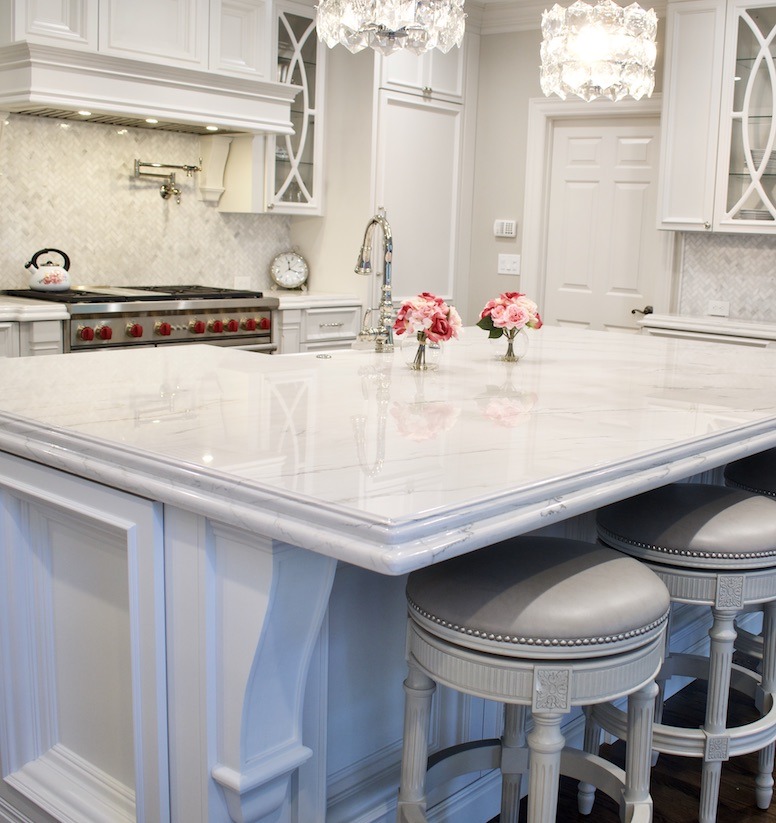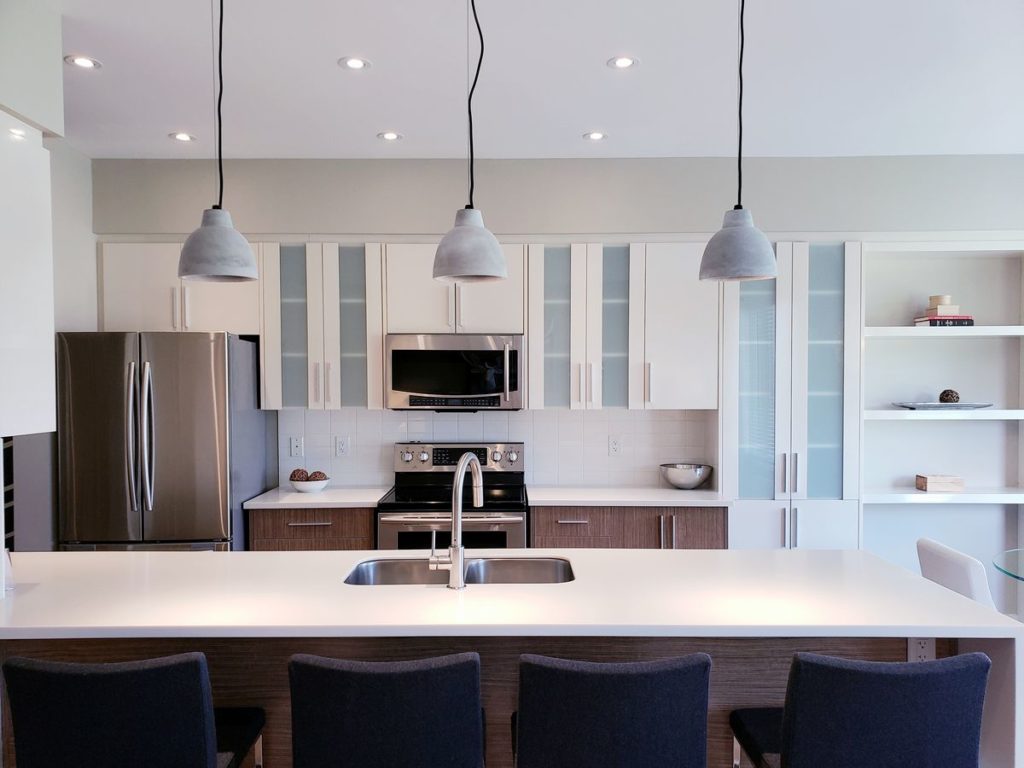Whether you’ve just completed a kitchen remodel or are simply curious, you’ve probably asked yourself, “How is quartz made?” and “How do they make quartz countertops?” These questions are common among homeowners drawn to the beauty and durability of quartz.
This article will explain the manufacturing process, providing an in-depth look at how this abundant mineral transforms into stunning quartz kitchen countertops.
What Is Quartz?
Quartz is one of the most abundant and widely distributed minerals in Earth’s crust. It is a hard, crystalline mineral composed of silicon and oxygen atoms. Recognized for its beauty and durability, quartz is commonly used in various industries, including the building and countertop industries.
Quartz crystals, particularly amethyst and citrine, are highly valued in jewelry due to their durability and beautiful colors. Beyond its aesthetic appeal, quartz finds wide applications in technology, especially in timekeeping, due to its piezoelectric qualities. This refers to the mineral’s ability to generate electricity under mechanical stress, which is beneficial in devices like watches, clocks, and sensors.
What Are the Different Types of Quartz for Countertops?
1. Silestone
Silestone is the most recognized name in quartz countertops and is known for its mix of durability and beauty. It’s made of more than 90% natural quartz and is available in more than 60 colors, making it easy to find the perfect match for any kitchen design.
2. Caesarstone
Caesarstone is a pioneer in the field of quartz countertops and is known for its great quality. It comes in a variety of colors, patterns, and finishes. So you can choose from a polished, matte, or rugged concrete finish.
3. Cambria
Cambria quartz is popular for its rich, elegant appearance. It is 93% pure quartz combined with resin and pigment, giving it a unique look. It has a large assortment of designs, with over 120 to choose from.
4. Corian Quartz
Corian Quartz, previously known as Zodiaq, is made by DuPont and is as resilient as granite. It boasts long-lasting durability, heat-resistant qualities, and a wide range of earthy, neutral, and bold colors.
5. HanStone
HanStone is a strong, hygienic, and high-performance quartz countertop. It offers unique design options and colors, including small-grain, large-grain, and mirrored quartz pieces to fit your kitchen’s aesthetic.

How Is Quartz Made?
1. Raw Materials
The answer to the question, “What are quartz countertops made of?” lies in a complex process of sourcing and assembling materials. High-quality quartz crystals are primarily sourced from regions such as Brazil and Arkansas. After being evaluated based on purity and size, those that satisfy the necessary standards are then crushed into fine dust. This dust then becomes the primary component of quartz countertops.
2. Mixture Creation
The ground quartz is then mixed with a specially formulated resin to create a viscous mixture. This resin not only binds the tiny quartz particles together but also provides strength and durability to the countertops. Modern techniques ensure that the resin is evenly distributed, guaranteeing uniformity in the final product.
3. Coloring
Pigments are added to the quartz-resin mixture to achieve various color variations in the countertops. Manufacturers use different pigments and techniques to ensure color consistency throughout each slab. The pigments not only allow for a broad spectrum of colors but also allow for the creation of vein patterns, mimicking the appearance of natural stones like granite and marble.
4. Compression and Forming
The pigmented quartz mixture is then compressed into molds under extreme pressure. This compression eliminates any air pockets, contributing to the countertops’ non-porous nature. The molds can vary in size and shape to create different slab dimensions and countertop edges.
5. Curing and Finishing
After the compression process, the slabs are cured at high temperatures to solidify the resin and quartz particles. This curing process further enhances the strength of the countertops, making them ideal for heavy kitchen use. Once the slabs are cooled, the surfaces are polished to achieve a glossy, vibrant finish, enhancing the color and texture of the quartz.
What Is the Difference Between Quartz and Other Natural Stones?
Durability
Quartz countertops are celebrated for their exceptional durability. The hardness of the quartz crystals and the strength of the binding resin result in a surface that is resistant to scratches, chips, and stains. This makes quartz countertops capable of withstanding the everyday hustle and bustle of kitchen activities, preserving their beauty and integrity over time.
Low Maintenance
Unlike natural stone countertops, which need to be sealed periodically to prevent staining, quartz countertops do not require such procedures due to their non-porous nature. This feature makes them resistant to water absorption, thereby reducing the risk of staining and bacterial growth. Daily cleaning calls for a simple wipe-down with a mild detergent, making quartz a low-maintenance option.
Variety of Colors
One of the significant advantages of quartz countertops is the wide range of colors available. The manufacturing process allows pigments to be added to the quartz mixture, resulting in diverse color options. This means homeowners can choose from classic white quartz countertops to vibrant, exotic colors and patterns, all tailored to complement various design aesthetics and preferences.
Consistency
Quartz countertops have a distinct edge over other natural stone countertops when it comes to consistency. Natural stones like granite or marble can have variations in pattern and color due to their organic nature. In contrast, quartz countertops, being engineered, offer consistent color and pattern throughout, providing a refined, unified appearance.
Heat Resistance
While quartz countertops are not entirely heat-proof, they can withstand moderate heat. However, continuous exposure to excessive heat can cause damage, including discoloration and cracking. Accordingly, it is always recommended to use trivets or hot pads under hot cookware to maintain the longevity and beauty of the quartz countertops.
How Are Quartz Countertops Made?
Step 1: Measuring and Templating
Before the quartz slabs can be fabricated, a professional installer takes meticulous measurements of the kitchen or bathroom space. The goal of this step is to ensure a seamless fit once the countertops are installed. Based on these measurements, detailed templates are created, which will be followed during the cutting and shaping of the quartz.
Step 2: Cutting and Edging
Using specialized tools, the template is then used to accurately cut the quartz slabs to the required size. At this stage, the edges of the slab are shaped to the desired profile. This could range from straight edges for a minimalist design to beveled or bullnose edges, which provide a rounded finish and a touch of elegance.
Step 3: Installation
Once the customized quartz slabs are ready, they are transported to the site for installation. Careful alignment and leveling ensure an accurate fit and a professional finish for the countertops. A strong adhesive is applied between the countertop and the base cabinets to secure the countertops in place and prevent any movement.
Step 4: Sealing and Finishing
While quartz countertops are naturally non-porous and resist stains, some manufacturers may apply a sealant to enhance this resistance further. This occurs after the counter has been installed. Lastly, the seams between the individual slabs are filled and polished meticulously, giving the countertops a uniform and seamless appearance.
Start Your Kitchen Transformation With Quartz Countertops Now at Let’s Get Stone’d Granite
Quartz countertops offer a remarkable combination of beauty, durability, and low maintenance. Understanding how quartz is made and the process involved in manufacturing quartz countertops can help homeowners make informed decisions when choosing countertop materials. With its wide variety of colors, non-porous surface, and resistance to scratches and stains, quartz is an excellent choice for those seeking high-quality natural stone countertops.
At Let’s Get Stone’d Granite, we proudly uphold the highest quality standards, giving you a countertop that reflects your style while maintaining functionality. Visit our website or contact us today to explore your quartz countertop options.

